Refine search
Actions for selected content:
15656 results for Feminist Judgments
Title match
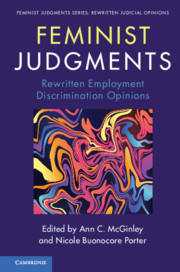
Feminist Judgments
- Rewritten Employment Discrimination Opinions
-
- Published online:
- 01 October 2020
- Print publication:
- 15 October 2020
Title match
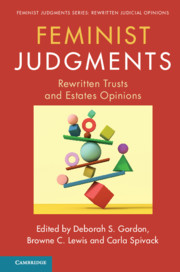
Feminist Judgments
- Rewritten Trusts and Estates Opinions
-
- Published online:
- 28 August 2020
- Print publication:
- 17 September 2020
Title match
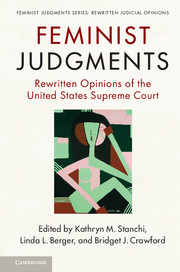
Feminist Judgments
- Rewritten Opinions of the United States Supreme Court
-
- Published online:
- 05 August 2016
- Print publication:
- 02 August 2016
Part II - The Feminist Judgments
-
- Book:
- Feminist Judgments: Rewritten Tax Opinions
- Published online:
- 28 December 2017
- Print publication:
- 28 December 2017, pp 53-316
-
- Chapter
- Export citation
Part II - The Feminist Judgments
-
- Book:
- Feminist Judgments: Reproductive Justice Rewritten
- Published online:
- 31 March 2020
- Print publication:
- 16 April 2020, pp 13-368
-
- Chapter
- Export citation
Part II - The feminist judgments
-
- Book:
- Feminist Judgments
- Published online:
- 05 August 2016
- Print publication:
- 02 August 2016, pp 53-54
-
- Chapter
- Export citation
Advisory Panel for Feminist Judgments Series
-
- Book:
- Feminist Judgments: Health Law Rewritten
- Published online:
- 15 December 2022
- Print publication:
- 22 December 2022, pp ix-x
-
- Chapter
- Export citation
Advisory Panel for Feminist Judgments Series
-
- Book:
- Feminist Judgments: Family Law Opinions Rewritten
- Published online:
- 08 July 2020
- Print publication:
- 25 June 2020, pp iv-vi
-
- Chapter
- Export citation
Titles in the US Feminist Judgments Series
-
- Book:
- Feminist Judgments: Health Law Rewritten
- Published online:
- 15 December 2022
- Print publication:
- 22 December 2022, pp xi-xii
-
- Chapter
- Export citation
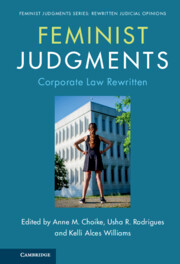
Feminist Judgments: Corporate Law Rewritten
-
- Published online:
- 15 January 2023
- Print publication:
- 05 January 2023
Advisory Panel for Feminist Judgments Series
-
- Book:
- Feminist Judgments
- Published online:
- 01 October 2020
- Print publication:
- 15 October 2020, pp iv-iv
-
- Chapter
- Export citation
Advisory Panel for Feminist Judgments Series
-
- Book:
- Feminist Judgments: Rewritten Tax Opinions
- Published online:
- 28 December 2017
- Print publication:
- 28 December 2017, pp iv-vi
-
- Chapter
- Export citation
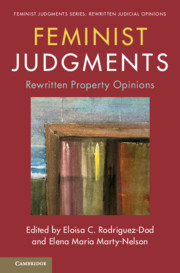
Feminist Judgments: Rewritten Property Opinions
-
- Published online:
- 21 October 2021
- Print publication:
- 28 October 2021
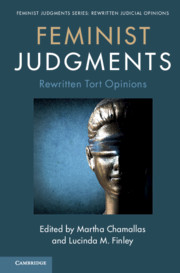
Feminist Judgments: Rewritten Tort Opinions
-
- Published online:
- 28 November 2020
- Print publication:
- 10 December 2020
Advisory Panel for Feminist Judgments Series
-
- Book:
- Feminist Judgments: Rewritten Criminal Law Opinions
- Published online:
- 01 December 2022
- Print publication:
- 15 December 2022, pp iv-iv
-
- Chapter
- Export citation
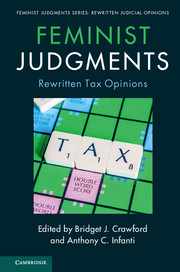
Feminist Judgments: Rewritten Tax Opinions
-
- Published online:
- 28 December 2017
- Print publication:
- 28 December 2017

Feminist Judgments: Reproductive Justice Rewritten
-
- Published online:
- 31 March 2020
- Print publication:
- 16 April 2020
Advisory Panel for Feminist Judgments Series
-
- Book:
- Feminist Judgments: Rewritten Property Opinions
- Published online:
- 21 October 2021
- Print publication:
- 28 October 2021, pp iv-iv
-
- Chapter
- Export citation
Advisory Panel for Feminist Judgments Series
-
- Book:
- Feminist Judgments
- Published online:
- 28 August 2020
- Print publication:
- 17 September 2020, pp iv-iv
-
- Chapter
- Export citation
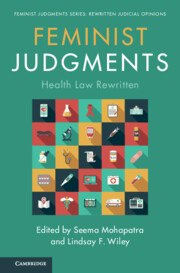
Feminist Judgments: Health Law Rewritten
-
- Published online:
- 15 December 2022
- Print publication:
- 22 December 2022
